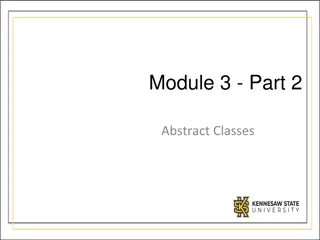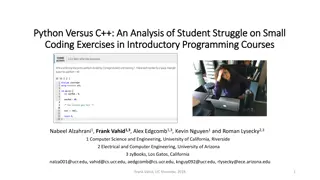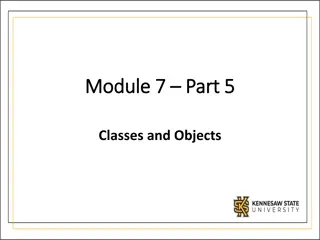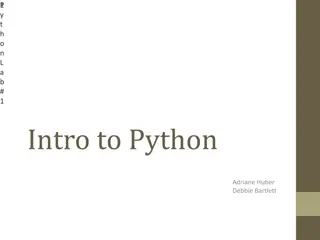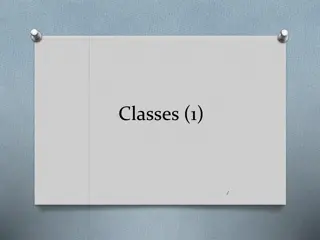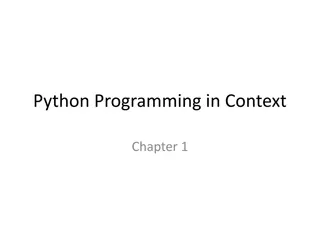Classes and Special Methods in Python
Classes in Python allow for creating objects with specialized methods like dunder methods. By employing these special methods, various mechanisms can be implemented seamlessly. For instance, the example of playing cards demonstrates how to define a class with methods such as __init__ and __str__. Additionally, using __dict__ or dir() attributes can help retrieve information about instances. Understanding the distinction between equality and identity is crucial when working with classes, as exemplified by defining the __eq__ method for attribute comparison. Lastly, comparing objects for identity can be achieved using 'is'. Overall, comprehensive knowledge of classes and special methods is vital for proficient Python programming.
Download Presentation

Please find below an Image/Link to download the presentation.
The content on the website is provided AS IS for your information and personal use only. It may not be sold, licensed, or shared on other websites without obtaining consent from the author.If you encounter any issues during the download, it is possible that the publisher has removed the file from their server.
You are allowed to download the files provided on this website for personal or commercial use, subject to the condition that they are used lawfully. All files are the property of their respective owners.
The content on the website is provided AS IS for your information and personal use only. It may not be sold, licensed, or shared on other websites without obtaining consent from the author.
E N D
Presentation Transcript
Classes 3 Thomas Schwarz, SJ
Classes through Special Methods Python: Many mechanisms use specialized (= dunder) methods
Classes through Special Methods Example: Playing cards (again) class Card: def __init__(self, suite, rank): self.suite = suite self.rank = rank def __str__(self): return "({:2s},{:2s})".format( self.suite[:2], self.rank[:2]) def __retr__(self): return '[Card' + str(self)+']'
Classes through Special Methods Can find all attributes of an instance defined using __dict__ or dir : >>> c=Card('heart', 'king') >>> c.__dict__ {'suite': 'heart', 'rank': 'king'} >>> dir(c) ['__class__', '__delattr__', '__dict__', '__dir__', '__doc__', '__eq__', '__format__', '__ge__', '__getattribute__', '__gt__', '__hash__', '__init__', '__init_subclass__', '__le__', '__lt__', '__module__', '__ne__', '__new__', '__reduce__', '__reduce_ex__', '__repr__', '__retr__', '__setattr__', '__sizeof__', '__str__', '__subclasshook__', '__weakref__', 'rank', 'suite']
Classes through Special Methods Equality versus Identity Default evaluation for == looks at location of storage Can get storage location with object.__repr__( ) Or in most Python implementation, with id >>> id(d) 140299613922544 >>> object.__repr__(d) '<__main__.Card object at 0x7f9a0ca664f0>' >>> hex(id(d)) '0x7f9a0ca664f0'
Classes through Special Methods Equality versus Identity This is usually not the behavior we want Equality means all attributes are equal Need to define __eq__ in your class class Card: def __eq__(self, other): return self.suite==other.suite and self.rank==other.rank >>> d=Card('heart', 'king') >>> c=Card('heart', 'king') >>> d==c True
Classes through Special Methods Equality versus Identity We can still compare for identity with is >>> d is c False
Classes through Special Methods You are sad, the Knight said in an anxious tone: let me sing you a song to comfort you. Is it very long? Alice asked, for she had heard a good deal of poetry that day. It slong, said the Knight, but very, very beautiful. Everybody that hears me sing it either it brings the tears into their eyes, or else Or else what? said Alice, for the Knight had made a sudden pause. Or else it doesn t, you know. The name of the song is called Haddocks Eyes. Oh,that s the name of the song, is it? Alice said, trying to feel interested. No, you don tunderstand, the Knight said, looking a little vexed. That s what the name is called. The name really is The Aged Aged Man. Then I ought to have said That s what the song is called ? Alice corrected herself. No, you oughtn t: that s quite another thing! The song is called Ways and Means : but that s only what it scalled, you know! Well, what is the song, then? said Alice, who was by this time completely bewildered. I was coming to that, the Knight said. The song really is A-sitting On A Gate : and the tune s my own invention.
Classes through Special Methods We cannot make cards into elements of sets without making them hashable >>> seta = {c} Traceback (most recent call last): File "<pyshell#36>", line 1, in <module> seta = {c} TypeError: unhashable type: 'Card'
Classes through Special Methods Need to declare a method __hash__ and a method __eq__ return hash(self.suite)*hash(self.rank) class Card: def __hash__(self): Now it works >>> c = Card('heart', 'king') >>> seta = {c} >>> c in seta True
Classes through Special Methods But to do this, we should make cards immutable Right now, we can just say c.rank = 'ace' Strategy: declare the components private Create a getter function Which we do by using a property generator
Classes through Special Methods Implementation class Card: def __init__(self, suite, rank): self._suite = suite self._rank = rank @property def suite(self): return self._suite @property def rank(self): return self._rank private attributes
Classes through Special Methods Implementation class Card: def __init__(self, suite, rank): self._suite = suite self._rank = rank @property def suite(self): return self._suite @property def rank(self): return self._rank made to behave like attributes
Classes through Special Methods "Perl does not have an infatuation with enforced privacy. It would prefer that you stayed out of its living room because you weren't invited, not because it has a shot-gun." - -Larry Wall, Creator of Perl
Classes through Special Methods Containers: Example: a deck of cards class Deck: def __init__(self, suites, ranks): self.cards = [Card(s,r) for s in suites for r in ranks] def __str__(self): retVal = [ ] for card in self.cards: retVal.append(str(card)) return '\n'.join(retVal)
Classes through Special Methods We want: Sequences: length and [ ] Slicing
Classes through Special Methods Implementing sequencing Define __len__ and __getitem__ class Deck: def __len__(self): return len(self.cards) def __getitem__(self, i): return self.cards[i]
Classes through Special Methods Now we can do the following: Get an element Randomly select Use slices >>> import random >>> deck = Deck(suites, rank) >>> random.choice(deck) >>> print(deck[5:10]) >>> print(deck[3])
Classes through Special Methods But we cannot shuffle a deck of cards >>> random.shuffle(deck) Traceback (most recent call last): File "<pyshell#66>", line 1, in <module> random.shuffle(deck) File "/Library/Frameworks/Python.framework/Versions/3.8/lib/python3.8/random.py", line 307, in shuffle x[i], x[j] = x[j], x[i] TypeError: 'Deck' object does not support item assignment
Classes through Special Methods We need to implement a __setitem__ method def __setitem__(self, position, card): self.cards[position] = card
Classes through Special Methods >>> deck = Deck(suites, ranks) >>> import random >>> random.shuffle(deck) >>> print(deck) (cl,ki) (di,ja) (cl,4 ) (he,3 ) (cl,9 )
Classes through Special Methods We could even use monkey-patching Define a function that takes deck, position, and card as arguments Dynamically create a Deck.__setitem__ method Deck.__setitem__ = setcard
Inheritance "We started to push on the inheritance idea as a way to let novices build on frameworks that could only be assigned by experts" - -Alan Kay: The Early History of Smalltalk
Inheritance To inherit from a class, just add the name of the base class in parenthesis class BlackjackCard(Card):
Inheritance To initialize a derived class, usually want to call the initializer of the base class values = {'ace':11, '2':2, '3':3, '4':4, '5':5, '6':6, '7':7, '8':8, '9':9, '10':10, 'jack':10, 'queen':10, 'king':10} class BlackjackCard(Card): def __init__(self, suite, rank): super().__init__(suite, rank) self.value = values[rank] self.softvalue = 1 if rank=='ace' else self.value def __str__(self): return "{} of {} with value {}({})".format( self.rank, self.suite, self.value, self.softvalue )
Inheritance Notice: All methods in the base class are still available and attributes But we can also override them def __hash__(self): return super().__hash__()^self.softvalue Calling base class function
Inheritance Multiple inheritance Allowed but tricky Diamond Problem class A: def ping(self): print('ping') class D(B,C): def ping(self): super().ping() def pang(self): super().ping() super().pong() C.pong(self) class B: def pong(self): print('pong') class C: def pong(self): print('PONG')
Inheritance Method Resolution for d.pong( ): First look in the current class Then look into B Then look into C Then look into A Implemented via __mro__, which lists the classes in a certain order Can avoid ambiguity by giving explicit class names in the invocation class D(B,C): def ping(self): super().ping() def pang(self): super().ping() super().pong() C.pong(self)
Inheritance Multiple inheritance can be used Can use inheritance to define an interface: A base class that requires that certain methods are implemented Then multiple inheritance is fine
Operator Overloading Fundamental Rule: Do not overload operators that do not make sense E.g. Addition for cards makes no sense Addition for complex numbers makes sense
Operator Overloading Unary Operations: - __neg__ Negative + __pos__ +x is not always the same as x ~ __inv__ Bitwise inverse of an integer
Operator Overloading Binary Operations When confronted with an expression a ^ b Python looks into the class of a for a method __xor__(self, other) If not found, then Python looks into the class of b for a method __rxor__(self, other)
Operator Overloading Binary Operations When Python sees a ^= b Then Python looks into the class of a for a method __ixor__(a,b) a = ixor(a,b) is equivalent to a^=b
Operator Overloading Implementation: All methods need to return an object Operands do not have to be from the same class
Operator Overloading class Complex: def __init__(self, re, im): self.re = re self.im = im def __str__(self): return "({},{})".format(self.re, self.im) def __add__(self, other): return Complex(self.re+other.re, self.im+other.im) def __iadd__(self, other): self.re += other.re self.im += other.im return self def __radd__(self, other): return self+other
Interfaces Interfaces encapsulate how a user can use a certain set of classes Python does not need interfaces and only implemented them as Abstract Base Classes (ABC) in 3.4
Interfaces Example: Sequences An interface describes what can be invoked
Interfaces Example: Sequences Some missing methods can be implemented via other methods in still works even without __contains__ and __iter__
Interfaces ABC: Abstract Base Class A class that does not have any methods implemented If you derive a class from an ABC: You have to implement these methods You make a public declaration that these methods are in your class
Interfaces class FrenchDeck(collections.MutableSequence): ranks = [str(n) for n in range(2, 11)] + list('JQKA') suits = 'spades diamonds clubs hearts'.split() def __init__(self): self._cards = [Card(rank, suit) for suit in self.suits for rank in self.ranks] def __len__(self): return len(self._cards) def __getitem__(self, position): return self._cards[position] def __setitem__(self, position, value): self._cards[position] = value def __delitem__(self, position): del self._cards[position] def insert(self, position, value): self._cards.insert(position, value)
Interfaces Here we have to implement methods that do not make sense for a deck of cards because MutableSequence demands them But now we get a whole lot of other methods that are implemented in terms of these methods


